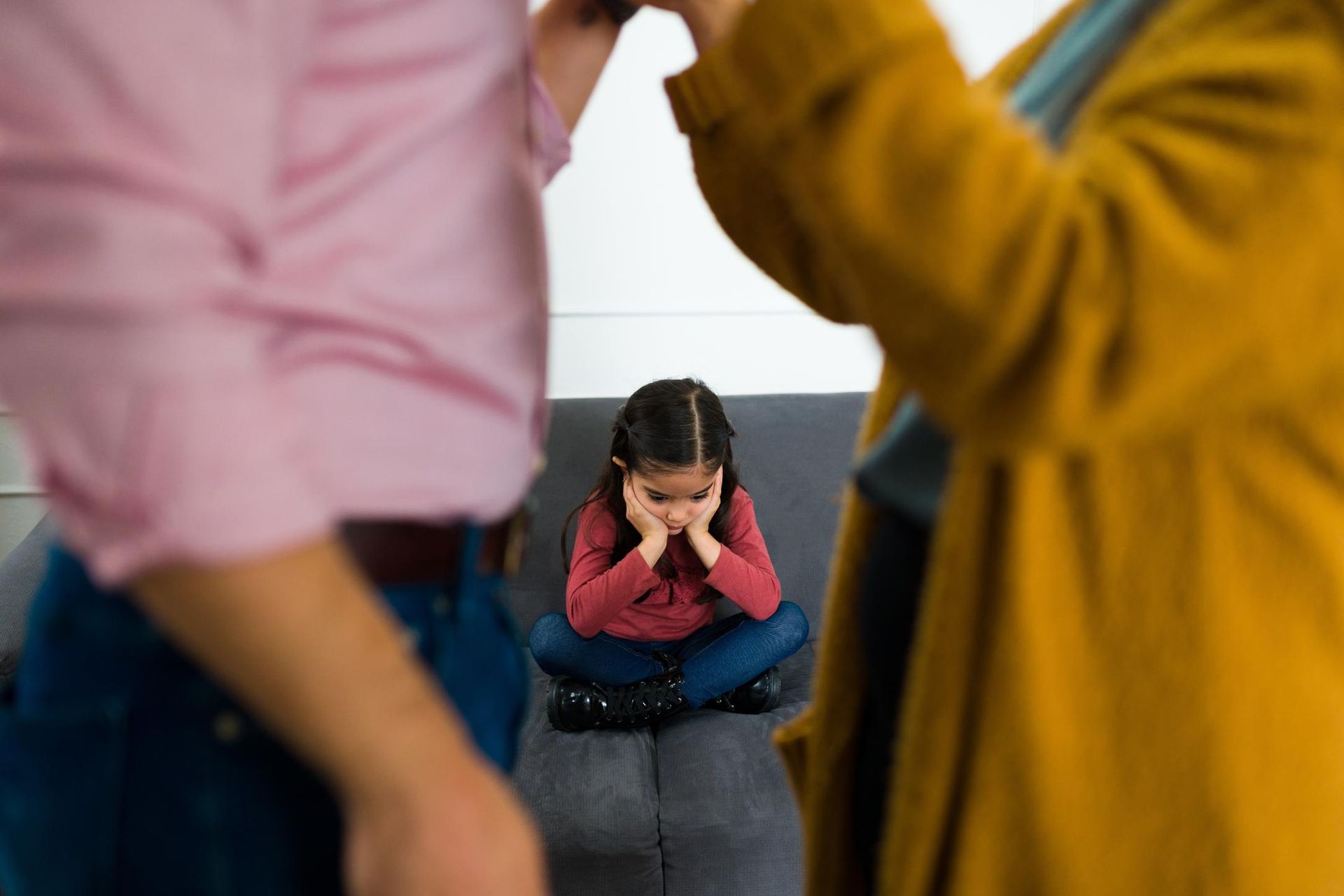Family Law Services
Servicing Louisville, Shepherdsville, Burlington and Shelbyville, KY
At Fernandez & Moloney PLLC, we understand the emotional and financial complexities involved in family law matters. Our legal team is committed to providing compassionate and comprehensive legal services for individuals and families facing issues such as divorce, child custody, and child support in Louisville, Shepherdsville, Burlington and Shelbyville, KY. With years of experience in family law, we work closely with our clients to navigate the legal process and secure the best possible outcomes for their futures.
Divorce
Divorce can be hard on a family in more ways than one, and we understand how emotionally charged these cases can be. Whether or not it was your decision, your divorce should proceed in a manner in which you have a voice that can be heard. That is why we strive to approach every case thoughtfully and with care and promise to be there every step of the way. We will draft documents to initiate the divorce, file all proper motions, attend mediation or do whatever else is necessary to help settle any disputes in court or to finalize an agreement for child custody, alimony, and/or the apportioning of marital property.
The state of KY is “no-fault” regarding grounds for divorce, meaning neither spouse has to show who is “at-fault” for the divorce (ex. adultery). Instead, the spouse filing for divorce only has to state that there had been an “irretrievable breakdown” in the relationship, and as a result divorce is the best course of action.
Contested Divorce
A divorce requires the Court to ensure an equitable division of the couple’s assets and debts, as well as potentially make decisions regarding any children. When an agreement on the terms and conditions of a divorce cannot be reached, the family court will likely refer both parties to mediation. Mediation is a process in which both parties and their attorneys meet with an impartial third party, known as a mediator. The goal of mediation is to assist the parties and their attorneys in resolving any outstanding issues in the most amicable and cost-effective manner possible. Mediation is an invaluable tool for parties to find individualized solutions for their families.
If the parties are unable to come to an agreement on all issues at mediation, the case will be scheduled for a hearing and/or trial for each party to present their arguments to the judge. Once the judge hears the case, he or she will make findings of fact and conclusions of law to resolve any outstanding issues. The length of time this requires varies based on the number and complexity of the unresolved issues as well as the parties’ willingness to compromise.
Contested divorces make an already emotional and stressful situation even more difficult. We rely on our extensive experience to provide strong representation and will ensure your rights and financial interests are safely guarded for your future well-being.
Uncontested Divorce
Many people want to resolve their divorces in the most efficient and amicable way possible. Many times this can be achieved through an uncontested divorce. If both spouses are in an agreement, we can work to help maintain this peace in your family while ensuring that you receive a fair settlement. An obvious advantage of an uncontested divorce is cost. Uncontested divorces are generally much less expensive than contested divorces. If couples are able to agree on the terms of their divorce, fees are minimized through the avoidance of court proceedings, mediation, and involvement of third-party professionals. Another advantage of uncontested divorces is the speed at which the process moves. In Kentucky, an uncontested divorce usually takes 60 to 90 days after filing the divorce papers. The process is shorter than a contested divorce because there are no court hearings or divorce proceedings.
Custody
Nothing is more important than your children and your role in their lives; that is why you need an attorney who understands how important these proceedings can be. When circumstances result in children living in different households there can be a number of challenges that might arise including relocation, scheduling conflicts, difficult co-parenting relationships, or difficulties with non-parents. As a parent, you recognize that their happiness and health matter the most, and the law respects that. What matters most to the Court in terms of your child is that you do what is in their best interests. In doing so, the Court will make determinations as to custody, parenting time, child support, and any other necessary decisions. These terms can often be confusing but in general mean:
- Custody - In Kentucky there is a presumption (rebuttable by a preponderance of evidence) that parents should share joint custody. Legal custody refers to the ability of a parent to make decisions regarding the child’s education, healthcare, religion, and other important major life decisions.
- Parenting time – There is also a rebuttable presumption that parents should share equal/equitable parenting time. While not always possible to divide time 50/50, Courts are supposed to work to ensure that the parents can be as close as possible after taking into consideration factors like jobs, school location, extra-curriculars, or other time constraints.
- Child Support - Children in Kentucky have the right to be supported by both of their parents. Child support payments are intended to provide for the daily care of the parties’ children. The Court, in setting a child support obligation, will apply the Kentucky Child Support Guidelines which consider the gross incomes of both parties, work-related childcare costs, the cost of the child’s medical insurance coverage, and the parties’ parenting schedule.
Child support continues until a child reaches the age of eighteen or graduates high school, whichever occurs last. It is always modifiable if there is a demonstrable change in circumstances. A change in circumstances is commonly defined by Courts as a fifteen percent change in the previously awarded child support amount.
What Does “in the Best Interest of the Child” Mean?
Kentucky law directs the court to consider the following list of specific factors when deciding what is in the best interest of a child. These factors are:
- the wishes of the child’s parents and any “de facto” custodian;
- the wishes of the child, considering any influence a parent or de facto custodian may have over these wishes;
- the child’s relationship with his or her parents, siblings, and anyone else who may significantly affect the child’s best interests;
- the motivation of the adults participating in the custody proceeding;
- the child’s adjustment and continuing proximity to home, school, and community;
- the mental and physical health of all individuals involved;
- domestic violence by one of the parties against the child or another party
- the extent to which the child has been cared for, nurtured, and supported by a de facto custodian;
- the intent of the parent or parents in placing the child with a de facto custodian and the circumstances under which the child was placed or allowed to remain in the custody of a de facto custodian; and
- the likelihood a party will allow the child frequent, meaningful, and continuing contact with the other parent or de facto custodian, unless there is a finding of domestic violence that endangers the health or safety the child or another party.
Protective Orders (EPO/IPO/DVO)
If your safety is at risk due to the actions of a family member, seeking a domestic violence order is imperative. A victim of domestic violence can request protection, often referred to as an emergency protective order, by filing a petition in their county of residence or in another county if they are fleeing domestic violence. This protection can be granted for the petitioner alone and/or on behalf of children under the age of eighteen (18). If you are a child, a safe adult family member may request protection on your behalf. The Jefferson County, Kentucky Domestic Violence Intake Center (DVIC) is available to you around the clock each and every day. The DVIC is located at the Hall of Justice at the corner of 6th Street and Jefferson Street.
If a protective order is issued, it will remain in effect pending a hearing to determine if further protection is necessary. The protective order may restrict an alleged perpetrator of domestic violence from contacting the petitioner, require that they leave a shared residence, restrict them from disposing of or destroying property, prevent them from owning firearms, or even award the petitioner temporary custody of children.
If the Court determines domestic violence has occurred and is likely to occur again, it will enter a domestic violence order for up to three (3) years. The specific conditions of each domestic violence order may differ but can include restrictions on contact, a prohibition on the ownership of firearms, removal from a shared residence, orders not to dispose or damage property, counseling requirements, and temporary custody and child support provisions.
Important terms:
- Domestic violence - Includes physical injury, stalking, sexual assault, assault, strangulation, or the infliction of fear through threats thereof committed at the hands of a family member.
- Stalking - To engage in an intentional course of conduct, directed at a specific person or persons, which seriously alarms, annoys, intimidates, or harasses the person or persons, serves no legitimate purpose, and would cause a reasonable person to suffer substantial mental distress. (I.e. any conduct prohibited as stalking under KRS 508.140 or 508.150).
- Family member - Any person living in the same household as a child if the child is the alleged victim. A spouse or former spouse, a domestic partner who you live or formerly lived with, a person who have a child in common with, a grandparent, a grandchild, a parent, an adult sibling, a child or stepchild, or any person living in the same household as a child if the child is the alleged victim.
Grandparents’ Rights
Divorce, separation, one parent’s death or other family changes can affect Grandparents relationship with their grandchildren. If you are a grandparent who has been denied access to your grandchildren because of such an event, you have the right to fight for visitation. The guiding principle for judges in deciding whether grandparent visitation is appropriate is what is in the children’s best interest. The grandparent will have the “burden of proof” which is the duty to provide sufficient evidence to show that visitation with them is in the child’s best interest.
Comprehensive Legal Support for Family Matters
Family law cases can be overwhelming, and it is crucial to have an experienced attorney who is dedicated to your case. At Fernandez & Moloney PLLC, we provide a full range of family law services, from divorce to child custody and support, with the goal of achieving the best possible outcome for you and your family. Our attorneys are committed to offering thoughtful, personalized legal representation tailored to your specific needs. If you are facing a family law issue in Louisville, Shepherdsville, Burlington and Shelbyville, KY, contact us today to schedule a consultation and learn how we can help you navigate this challenging time.










